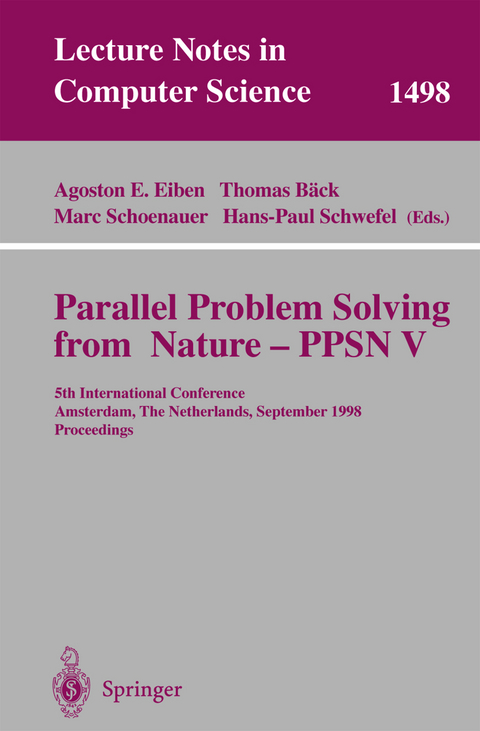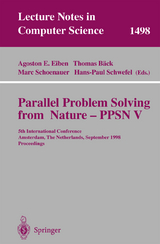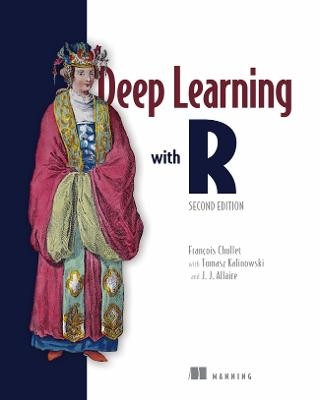Parallel Problem Solving from Nature - PPSN V
Springer Berlin (Verlag)
978-3-540-65078-2 (ISBN)
The 101 papers included in their revised form were carefully reviewed and selected from a total of 185 submissions. The book is divided into topical sections on convergence theory; fitness landscape and problem difficulty; noisy and non-stationary objective functions; multi-criteria and constrained optimization; representative issues; selection, operators, and evolution schemes; coevolution and learning; cellular automata, fuzzy systems, and neural networks; ant colonies, immune systems, and other paradigms; TSP, graphs, and satisfiability; scheduling, partitioning, and packing; design and telecommunications; and model estimations and layout problems.
Modelling genetic algorithms: From Markov chains to dependence with complete connections.- On the optimization of unimodal functions with the (1+1) evolutionary algorithm.- A timing analysis of convergence to fitness sharing equilibrium.- Where elitists start limping evolution strategies at ridge functions.- A bit-wise epistasis measure for binary search spaces.- Inside GA dynamics: Ground basis for comparison.- The effect of spin-flip symmetry on the performance of the simple GA.- Fitness distance correlation and Ridge functions.- Accelerating the convergence of evolutionary algorithms by fitness landscape approximation.- Modeling building-block interdependency.- Mutate large, but inherit small! On the analysis of rescaled mutations in ( )-ES with noisy fitness data.- Creating robust solutions by means of evolutionary algorithms.- Analytic curve detection from a noisy binary edge map using genetic algorithm.- A comparison of dominance mechanisms and simple mutation on non-stationary problems.- Adaptation to a changing environment by means of the feedback thermodynamical genetic algorithm.- Optimization with noisy function evaluations.- On risky methods for local selection under noise.- Polygenic inheritance - A haploid scheme that can outperform diploidy.- Averaging efficiently in the presence of noise.- Solving binary constraint satisfaction problems using evolutionary algorithms with an adaptive fitness function.- Varying fitness functions in genetic algorithms: Studying the rate of increase of the dynamic penalty terms.- Landscape changes and the performance of Mapping Based Constraint handling methods.- A decoder-based evolutionary algorithm for constrained parameter optimization problems.- A spatial predator-prey approach to multi-objective optimization: Apreliminary study.- Selective breeding in a multiobjective genetic algorithm.- Niching and elitist models for MOGAs.- Parallel evolutionary optimisation with constraint propagation.- Methods to evolve legal phenotypes.- Multiobjective optimization using evolutionary algorithms - A comparative case study.- Utilizing dynastically optimal forma recombination in hybrid genetic algorithms.- Further experimentations on the scalability of the GEMGA.- Indexed memory as a generic protocol for handling vectors of data in genetic programming.- On genetic algorithms and lindenmayer systems.- Genome length as an evolutionary self-adaptation.- Restart scheduling for genetic algorithms.- A comparative study of global and local selection in evolution strategies.- UEGO, an abstract niching technique for global optimization.- Development of problem-specific evolutionary algorithms.- The effects of control parameters and restarts on search stagnation in evolutionary programming.- Accelerating the evolutionary-gradient-search procedure: Individual step sizes.- Extending population-based incremental learning to continuous search spaces.- Multi-parent recombination in genetic algorithms with search space boundary extension by mirroring.- Selective crossover in genetic algorithms: An empirical study.- Line-breeding schemes for combinatorial optimization.- Finding regions of uncertainty in learned models: An application to face detection.- On ZCS in multi-agent environments.- Empirical analysis of the factors that affect the Baldwin effect.- Promoting generalisation of learned behaviours in genetic programming.- Generalization in Wilson's classifier system.- Symbiotic coevolution of artificial neural networks and training data sets.- Information-theoretic analysis of a mobile agent'slearning in a discrete state space.- The coevolution of antibodies for concept learning.- Does data-model co-evolution improve generalization performance of evolving learners?.- A corporate classifier system.- Applying diffusion to a cooperative coevolutionary model.- Studying parallel evolutionary algorithms: The cellular programming case.- Learning to avoid moving obstacles optimally for mobile robots using a genetic-fuzzy approach.- Evolutionary neural networks for nonlinear dynamics modeling.- Hybrid distributed real-coded genetic algorithms.- Mechanisms of emergent computation in cellular automata.- Towards designing neural network ensembles by evolution.- Selection of training data for neural networks by a genetic algorithm.- Discovery with genetic algorithm scheduling strategies for cellular automata.- Simple + parallel + local = cellular computing.- Evolution, learning and speech recognition in changing acoustic environments.- Ant colonies for adaptive routing in packet-switched communications networks.- The stud GA: A mini revolution?.- An island model based ant system with lookahead for the shortest supersequence problem.- Parameter-free Genetic Algorithm inspired by "disparity theory of evolution".- Immune network dynamics for inductive problem solving.- Parallelization strategies for Ant Colony Optimization.- Self-organising pattern formation: Fruit flies and cell phones.- A new genetic local search algorithm for graph coloring.- Improving the performance of evolutionary algorithms for the satisfiability problem by refining functions.- Memetic algorithms and the fitness landscape of the graph bi-partitioning problem.- Investigating evolutionary approaches to adaptive database management against various quality of service metrics.- Genetic algorithmbehavior in the MAXSAT domain.- An adaptive mutation scheme for a penalty-based graph-colouring GA.- Inver-over operator for the TSP.- Repair and brood selection in the traveling salesman problem.- The Traveling Salesrep Problem, Edge Assembly Crossover, and 2-opt.- Load balancing in parallel circuit testing with annealing-based and genetic algorithms.- A heuristic combination method for solving job-shop scheduling problems.- Reduction of air traffic congestion by genetic algorithms.- Timetabling the classes of an entire university with an evolutionary algorithm.- Genetic algorithms for the Multiple Container Packing Problem.- Buffer memory optimization in DSP applications: An evolutionary approach.- The Breeder Genetic Algorithm for frequency assignment.- A permutation based Genetic Algorithm for minimum span frequency assignment.- Comparison of Evolutionary Algorithms for design optimization.- Aspects of digital evolution: Evolvability and architecture.- Integrated facility design using an evolutionary approach with a subordinate network algorithm.- An evolutionary algorithm for synthesizing optical thin-film designs.- Implementing genetic algorithms with sterical constraints for protein structure prediction.- Optimal placements of flexible objects: An adaptive simulated annealing approach.- Encapsulated Evolution strategies for the determination of group contribution model parameters in order to predict thermodynamic properties.- Recombination operators for evolutionary graph drawing.- Optimisation of density estimation models with evolutionary algorithms.- Genetic algorithm in parameter estimation of nonlinear dynamic systems.- Optimizing web page layout using an annealed genetic algorithm as client-side script.- Solving the capacitor placement problem in a radialdistribution system using an adaptive genetic algorithm.
| Erscheint lt. Verlag | 16.9.1998 |
|---|---|
| Reihe/Serie | Lecture Notes in Computer Science |
| Zusatzinfo | XLVI, 1585 p. |
| Verlagsort | Berlin |
| Sprache | englisch |
| Maße | 155 x 235 mm |
| Gewicht | 1323 g |
| Themenwelt | Informatik ► Theorie / Studium ► Algorithmen |
| Schlagworte | Algorithm analysis and problem complexity • Evolutionäre Algorithmen • Evolutionary Programming • Evolution (Biol.) • Evolvable Systems • Fuzzy Systems • Genetic algorithms • Genetische Algorithmen • Genetischer Algorithmus • Hardcover, Softcover / Informatik, EDV/Informatik • HC/Informatik, EDV/Informatik • Immune Systems • neural network • Parallelprogrammierung • Partition • Scheduling |
| ISBN-10 | 3-540-65078-4 / 3540650784 |
| ISBN-13 | 978-3-540-65078-2 / 9783540650782 |
| Zustand | Neuware |
| Informationen gemäß Produktsicherheitsverordnung (GPSR) | |
| Haben Sie eine Frage zum Produkt? |
aus dem Bereich




